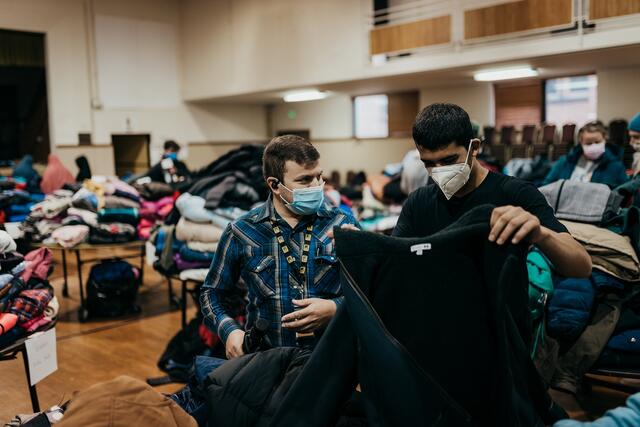One of the most significant barriers for new Americans is language access. Everyday tasks like going to the grocery store, riding public transportation, or even going to a medical appointment can become frustrating experiences when barriers to communication arise. For newly arriving refugee families, learning English is a priority, but can take time and practice to become proficient. Upon arrival and in the months after resettling, the International Rescue Committee (IRC) in Salt Lake City’s team of trained interpreters help families overcome challenges and access the services they need. Interpreters at the IRC act as liaisons and advocates for refugee families working hard to rebuild their lives in a new community.
Farah Al-Hamdani, interpreting service supervisor for the IRC, explains the interpreter’s role,’ “We have the ability to bridge the gap between case-workers and client, building trust that demands presence throughout out organization.” To Farah, this means working hard to create a basis of respect for the newly-arrived individual and their cultural traditions as they transition into a new environment.

Working closely with all programs at the IRC in Salt Lake City, interpreters focus on providing a clear avenue of communication. One moment, an interpreter may be transporting a family to a medical appointment and ensuring clear connection with clinic staff; the next moment, they may be supporting with a cultural orientation class or program meeting. Interpreters work hard to be available when needed, providing access to 13 languages- like Dari, Kinyarwanda, French, and Arabic-and supporting families and individuals from more than 20 different countries.
Cultural awareness and humility key for a successful and skilled interpreter. Often members of the communities served, interpreters bring lived experiences of cultural traditions and social norms that influence their day-to-day interactions. This also provides deeper awareness of the needs of those served by the IRC in Salt Lake City. One interpreter* recently noted, “We aid in creating their livelihoods. We make them feel self-fulfilled and comforted in their surroundings."
Speaking to the recent arrivals of Afghan families, another interpreter mentioned the importance of cultural understanding: “How to talk to them, how to deal with each family coming from a different tribe, we have to keep respect. Whether they are sensitive about women or other cultural items, these are things that I believe interpreters play an important role.”
Program successful at the IRC is often predicated on the expertise and experience of an interpreter. To begin creating relationships with others, we must understand their humanity, culture, language and more. Interpreters at the IRC in Salt Lake City understand this need, “Feeling like you are an outsider or stranger is horrible, until you become more comfortable and settled, it takes time,” another interpreter noted. Interpreters offer a critical support to the work of the IRC, helping refugees and other displaced people settle into their lives in the United States.
The IRC in Salt Lake City’s interpreter program is looking for skilled individuals to fill paid and volunteer interpreter roles to support an increase in refugee resettlement as well as welcoming Afghan evacuees to the Beehive State. You can learn more about available positions by visiting Rescue.org/Careers, clicking “Search jobs and apply” and selecting “Salt Lake City, UT” as your location.
